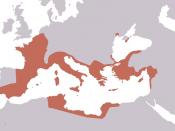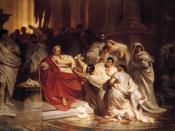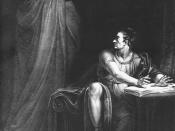"Ha, who comes here?...Thy evil spirit, Brutus" (4.3.318,325). The remover of an oppressive power may ironically share the same characteristics of the oppressor. In Shakespeare's Julius Caesar, the similarities between Brutus and Caesar, the liberator and oppressor, are seen in many characteristics. Brutus reflects Caesar's pride, carelessness, and methods to gain power. Brutus, as seen in the quote, is just a reflection of Julius Caesar and his character.
The family honor of Brutus in protecting the republic is equal to Caesar honoring himself and establishing a monarchy. Initially Brutus is swayed by Cassius because of family pride. "O, you and I have heard our fathers say there was a Brutus once that would have brooked th' eternal devil to keep his state in Rome as easily as a king" (1.3.159). Here Cassius is referring to Brutus' ancestor who rid Rome of a ruler and created the republic. Brutus puts his own honor before Rome and the republic, not caring for what might happen if someone powerful like Caesar is killed.
Caesar's vanity is similar in that he puts his wants before those of the people. "But I am constant as the Northern Star, Of whose true fixed and resting quality There is no fellow in the firmament" (3.1.66-68). Caesar puts his pride in being consistent in front of what's better for the people. The similarity in Brutus' honor and Caesar's pride proves both to be equally vain and selfish, not considering others.
Both Brutus and Caesar prove to be careless and not thinking of the dangers ahead. Brutus does not heed warning the warning of Caesar's ghost when he appears and says, "To tell thee thou shalt see me at Philippi" (4.3.27). The ghost predicts Brutus' death, but Brutus pays no heed to the warning. If more careful, he...


